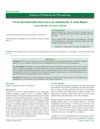 31 citations,
January 2003 in “Dermatology”
31 citations,
January 2003 in “Dermatology” Steroidogenic isoenzymes may help improve treatments for common hair loss.
 12 citations,
October 2004 in “Experimental Gerontology”
12 citations,
October 2004 in “Experimental Gerontology” Changes in testosterone and estrogen receptor genes can affect how men age, influencing body fat, hair patterns, and possibly leading to skin disorders.
 54 citations,
July 2002 in “Clinical and Experimental Dermatology”
54 citations,
July 2002 in “Clinical and Experimental Dermatology” DHT, a testosterone byproduct, causes male pattern baldness.
 32 citations,
October 2003
32 citations,
October 2003 Spironolactone is better than placebo for reducing excessive hair growth in women, but its effectiveness for acne is unclear due to small study sizes.
 20 citations,
August 2005 in “Journal of Cutaneous Pathology”
20 citations,
August 2005 in “Journal of Cutaneous Pathology” The protein ARA70/ELE1 is involved in male pattern baldness, and lower levels of its short form may lead to hair thinning.
 15 citations,
November 2015 in “Journal of Cosmetic Dermatology”
15 citations,
November 2015 in “Journal of Cosmetic Dermatology” Botanicals like green tea extract show potential for hair growth, but more research is needed.
 122 citations,
November 2010 in “Journal of Dermatological Science”
122 citations,
November 2010 in “Journal of Dermatological Science” Male pattern baldness involves hormones and cell signals affecting hair growth.
 27 citations,
October 1999 in “Experimental and Molecular Pathology”
27 citations,
October 1999 in “Experimental and Molecular Pathology” Stump-tailed macaque best for researching hair loss causes and treatments.
 August 2024 in “Stem Cell Research & Therapy”
August 2024 in “Stem Cell Research & Therapy” New regenerative therapies show promise for treating hair loss.
 January 2015 in “Hair therapy & transplantation”
January 2015 in “Hair therapy & transplantation” New hair and scalp disease diagnosis methods are important for correct treatment.
1 citations,
December 2022 in “Bioactive Materials” The microneedle patch with quercetin, zinc, and copper effectively promotes hair regrowth for androgenic alopecia.
 100 citations,
September 1999 in “British Journal of Dermatology”
100 citations,
September 1999 in “British Journal of Dermatology” The study found that two enzymes linked to hair loss are located in different parts of the scalp, supporting a common treatment's effectiveness.
 9 citations,
October 1988 in “Clinics in Dermatology”
9 citations,
October 1988 in “Clinics in Dermatology” Hair loss is caused by genetics and hormones, diagnosed through examination and biopsy, and treated with medications or surgery.
 1 citations,
February 2023 in “Drug Design Development and Therapy”
1 citations,
February 2023 in “Drug Design Development and Therapy” Plant adaptogens may help treat skin diseases and improve skin health, but more research is needed to fully understand how they work.
 December 2019 in “Journal of pediatrics & neonatology”
December 2019 in “Journal of pediatrics & neonatology” A 13-year-old boy had a rare, stable type of hair loss with little chance of regrowth, but treatment is available for looks.

Low-level laser therapy combined with Neoptide improved hair regrowth better than either treatment alone in rats.
 1 citations,
March 2021 in “Skin health and disease”
1 citations,
March 2021 in “Skin health and disease” Better hair loss models needed for research.
 29 citations,
June 2005 in “Journal of Zoo and Wildlife Medicine”
29 citations,
June 2005 in “Journal of Zoo and Wildlife Medicine” Most hair loss in captive rhesus macaques is likely due to environmental and behavioral factors.
 45 citations,
August 2019 in “Dermatologic Therapy”
45 citations,
August 2019 in “Dermatologic Therapy” Hair loss treatments work better with lifestyle changes.
 1 citations,
December 2010 in “InnovAiT”
1 citations,
December 2010 in “InnovAiT” The document concludes that accurate diagnosis and appropriate management are crucial for treating various hair disorders, which have significant psychological impacts.
 33 citations,
November 2006 in “Survey of Ophthalmology”
33 citations,
November 2006 in “Survey of Ophthalmology” Madarosis is the loss of eyelashes and eyebrows due to various health issues and requires thorough examination to diagnose and treat the underlying cause.
 April 2024 in “Scientific reports (Nature Publishing Group)”
April 2024 in “Scientific reports (Nature Publishing Group)” Rosemary and neem extract may be an effective natural treatment for dandruff and hair loss.
 19 citations,
February 2008 in “Archives of Dermatological Research”
19 citations,
February 2008 in “Archives of Dermatological Research” Mast cells might contribute to hair loss by causing skin thickening.
 15 citations,
June 2018 in “Journal of Chromatographic Science”
15 citations,
June 2018 in “Journal of Chromatographic Science” Researchers developed a method to measure plant compounds in rat blood and found they are quickly absorbed and eliminated within 36 hours.
 2 citations,
November 2013 in “International Journal of Dermatology”
2 citations,
November 2013 in “International Journal of Dermatology” ALDOA levels drop in hair cells during hair loss.
 7 citations,
January 2018 in “Skin appendage disorders”
7 citations,
January 2018 in “Skin appendage disorders” The document suggests recognizing "trichiatrists" as doctors specializing in hair and scalp health, using evidence-based treatments.
September 2024 in “Fitoterapia” Camellia oleifera seed shell polyphenols and 1,3,6-tri-O-galloylglucose can help treat hair loss by reducing certain hormones and promoting hair growth.
 November 2024 in “Applied Sciences”
November 2024 in “Applied Sciences” Placenta products might help with hair loss, but more research is needed.
 14 citations,
July 2016 in “Environmental Toxicology and Pharmacology”
14 citations,
July 2016 in “Environmental Toxicology and Pharmacology” Cedrol may prevent hair loss caused by chemotherapy better than minoxidil.
Curcuma aeruginosa Roxb. may help treat hair loss by affecting specific biological pathways.



























